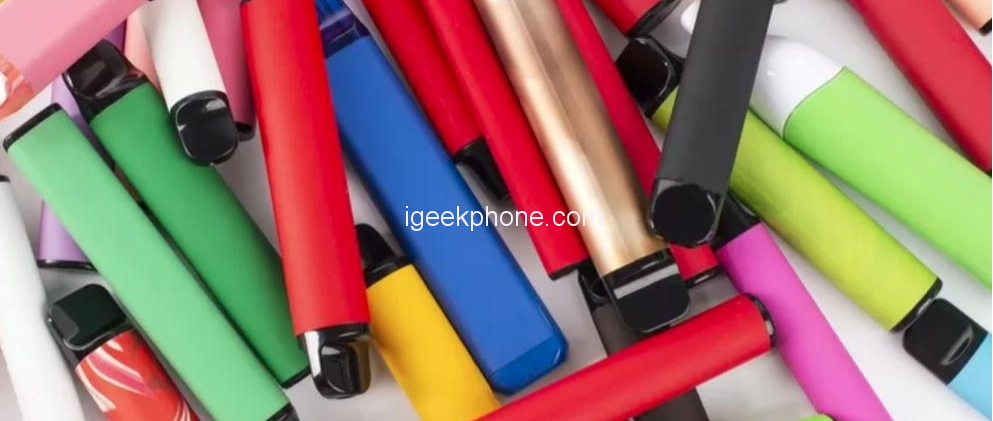The US Food and Drug Administration has ordered its import inspectors to detain Elf Bar and Esco Bar single-use e-cigarettes shipped to US ports from manufacturers and exporters in China and South Korea. These products have been placed on the import Red List, which allows them to be detained at U.S. ports of entry without a medical examination.
Packages identified as containing Elf Bar or Esco Bar products from Red List shippers may be withheld because they are unauthorized tobacco products. The shipper or manufacturer needs to prove that the product is legal before it can be removed from the red List and continue to its U.S. destination. Import alerts represent current guidance for FDA field personnel.
“Detention without inspection”
The alert lists Elf Bar under its ELFBAR and EBDESIGN names and designates six Chinese shippers that can detain its products, in addition to one address from the Republic of Korea and one in the United States. The document lists Esco Bar’s six Chinese shippers and a U.S. address.
In the notes section of each Elf Bar shipper, FDA states that its Center for Tobacco Products (CTP) has determined that this company may be importing/manufacturing/shipping a new tobacco product (Elf Bar/Elfbar or EBDESIGN) without marketing authorization. Tobacco products that lack premarket authorization requirements are considered adulterated. The same language is used for each Esco Bar shipper. Each red List entry is dated May 15 or May 17.
The alert was issued by the FDA’s Office of Import Operations, part of the Office of Regulatory Affairs (ORA). But the impetus to crack down on imports comes from CTP.
“Relevant authorities may detain tobacco products identified on the red list of this import alert without conducting a medical examination.” “The FDA alert said. “If the department is unsure whether a tobacco product is the same as a product identified on the Red List, the department should consult the Center for Tobacco Products (CTP). Adding a product to the Red List requires CTP consent.”
Withholding products with pending PMTA is new
The alert is based on the products in question being sold without FDA authorization, which technically makes them illegal (adulterated and mislabeled) – but the FDA has so far allowed products with pending premarket tobacco applications (PMtas) to remain on the market undisturbed. The question is whether the FDA’s enforcement discretion allows the agency to pick two brands (out of thousands) with pending PMtas to enforce.
Vaping360 was informed by a major Elf Bar distributor that both Elf Bar and Esco Bar submitted PMtas within a short period of time last year and that the FDA accepted PMtas for products containing synthetic nicotine. The distributor said the FDA could face lawsuits challenging the import ban.
“Unless the Supreme Court or Congress steps in, the FDA will simply double and redouble its current whack-a-mole enforcement strategy.” Gregory Conley, director of legislative and external affairs for the American Steam Manufacturers Association, told Vaping360. “Arbitrarily selecting products to be considered specifically prohibited is what federal agencies do when there is no effective long-term vision or plan.”
In 2009, the FDA’s drug office confiscated e-cigarettes shipped from China, sparking a court battle that NJOY’s owners won. The FDA gained regulatory authority over tobacco products shortly after those seizures were called into question, and then in 2016, the agency granted itself regulatory authority over e-cigarette products by designating them as tobacco.
The FDA is under pressure to enforce disposables
The FDA is under pressure from anti-vaping groups like the Campaign for Tobacco-Free Kids to crack down on single-use e-cigarettes (and all flavored and synthetic nicotine e-cigarette products). But pressure is also coming from Congress — and from a big tobacco company that also sells vaping products.
RJ Reynolds – the maker of Vuse e-cigarettes, including the hugely popular Vuse Alto – filed a citizen petition with the FDA in February, asking the agency to prioritize enforcement of illegally marketed single-use electronic nicotine delivery system (‘ENDS’) products in order to better protect public health. Shortly after Reynolds’ petition, a bill was introduced in the House of Representatives that would require the FDA to prioritize enforcement on disposals.
Many also believe that Renault is a funder of a strange anti-sex campaign run by a so-called consumer group called Consumer Action for a Strong Economy. The campaign included social media posts and signboard trucks driving around FDA offices in Washington, D.C. The truck carried messages condemning the FDA for not taking action on flavored disposables aimed at minors.
Single-use e-cigarettes like Elf Bar and Esco Bar surged in popularity after early 2020, when the FDA announced a priority to crack down on vaping products marketed in flavors other than tobacco and menthol based on smoke bombs and vaping bombs. In the two years after the FDA changed its enforcement priorities, disposables made up 33% of the convenience store segment of the e-cigarette market.












